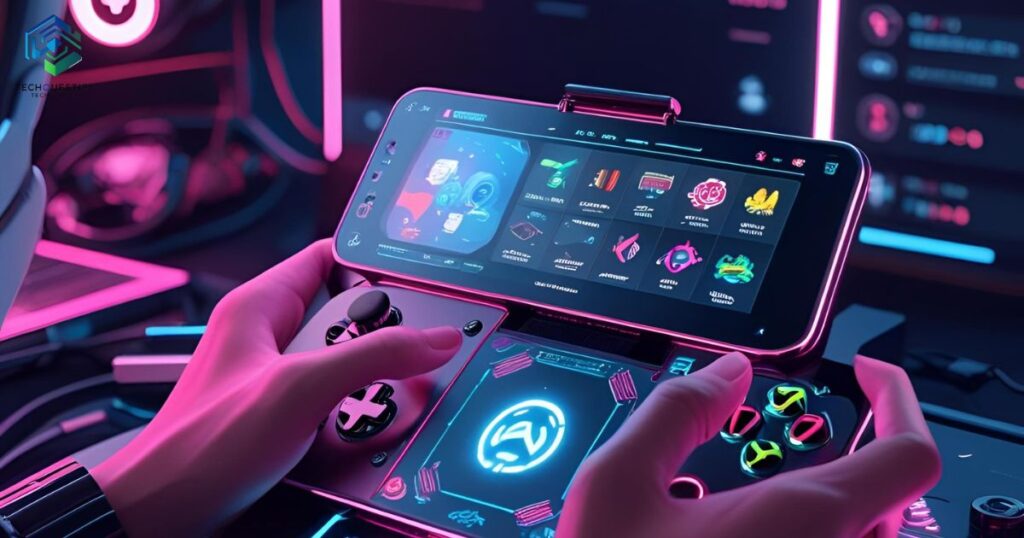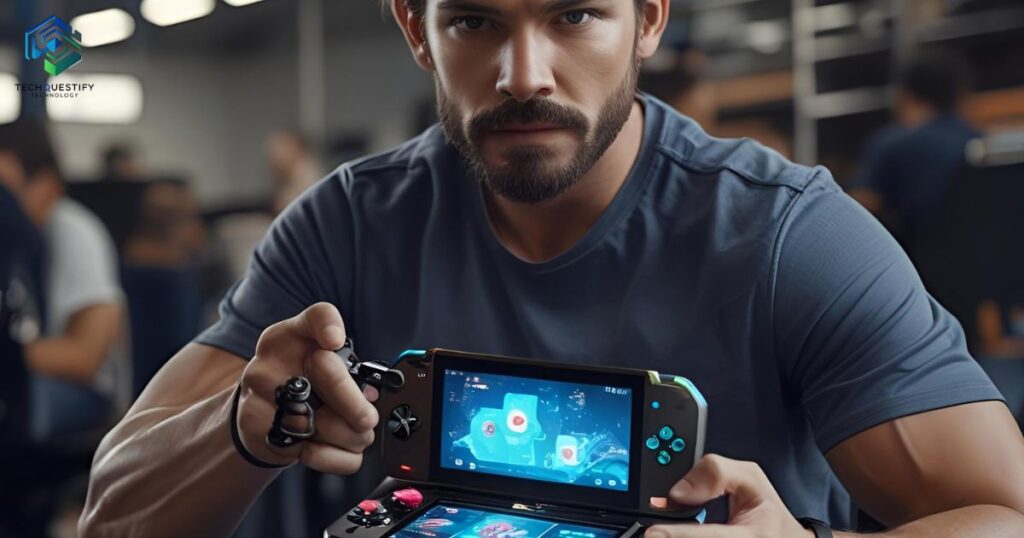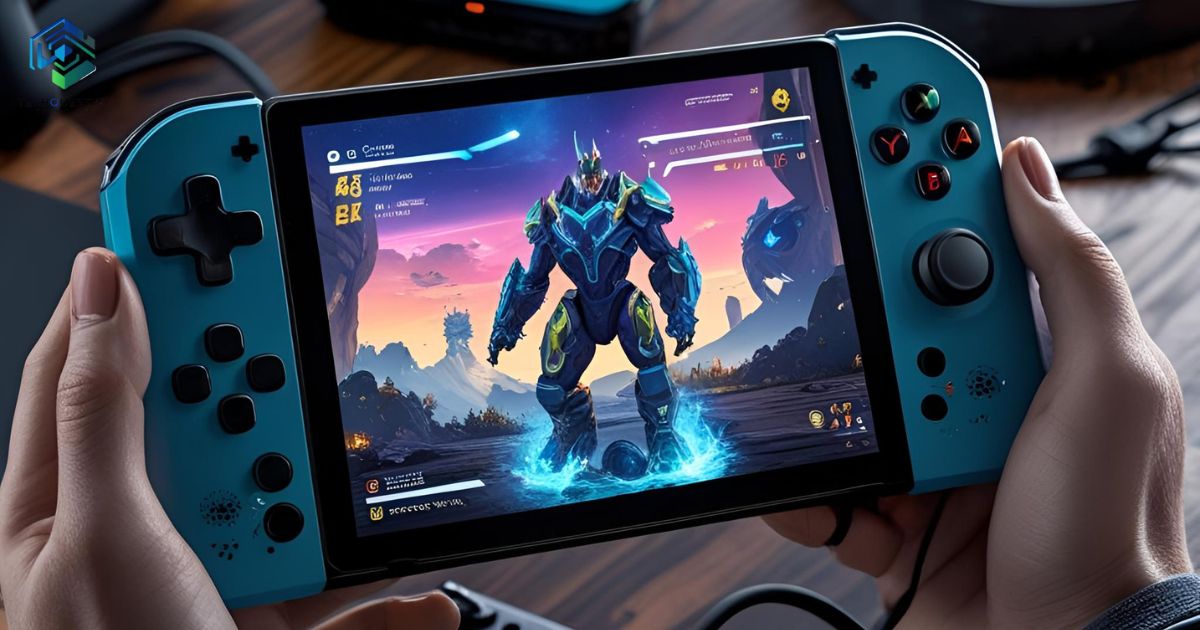Portable Gaming in 2025 has transformed from a casual pastime into a full-scale gaming revolution. With the rise of powerful handhelds like the GPD Win 5, Steam Deck, ASUS ROG Ally, and Lenovo Legion Go, gamers now enjoy desktop-level performance in the palm of their hands. These devices pack AI-powered processors, advanced GPUs, and cloud gaming integration, delivering console-quality visuals and seamless gameplay on the go.
No longer limited to basic titles, handhelds now handle demanding AAA games effortlessly. This shift represents the true golden age of portable gaming, where freedom, power, and performance finally converge.This blog explores the evolution of handheld gaming, the rise of powerful new devices, and the future of portable gaming in 2025. It also examines challenges, consumer benefits, and industry implications, making it a must-read for both gamers and technology enthusiasts.
The Evolution of Handheld Gaming
Handheld consoles have always been a bridge between gaming mobility and convenience. The Game Boy became a cultural icon in the 1990s, proving that gamers wanted portable entertainment. Its successors, including the Game Boy Advance, PlayStation Portable (PSP), Nintendo DS, and PlayStation Vita, refined the formula but remained underpowered compared to home consoles and PCs.
The turning point came in 2017 with the Nintendo Switch. The hybrid design allowed players to seamlessly switch between handheld and docked console gaming. The Switch’s success—selling over 130 million units—proved that portability and console-quality handhelds were not only viable but highly desirable.
This paved the way for PC-based handhelds. Unlike earlier devices limited to custom game libraries, new handhelds allow users to install full Windows or Linux operating systems, giving them access to Steam, Epic Games, Xbox Game Pass, and emulators. This convergence of PC flexibility and handheld portability is what defines the modern era.
Performance Standwhat-is-the-online-game-event-lcfgameventards of Handhelds in 2025
The leap in handheld performance is not incremental—it’s revolutionary. Here’s why handhelds in 2025 are redefining expectations:
1. Desktop-Class Processors
AMD and Intel now design chips tailored for handheld consoles. The AMD Ryzen AI Max Plus 395 delivers processing power on par with mid-tier gaming desktops. With AI acceleration built-in, it not only improves gaming performance but also handles productivity tasks like video editing and AI-based applications.
2. Advanced GPUs for Handhelds
Modern handhelds feature RDNA3-based integrated GPUs or mobile NVIDIA graphics capable of running demanding titles at 1080p high settings. Games like Starfield and Elden Ring can run smoothly on devices once thought too small for such workloads.
3. Cooling Solutions
High power usually means high heat. In 2025, handhelds integrate vapor chamber cooling systems, intelligent fan control, and thermal throttling management. This allows sustained performance without overheating or becoming uncomfortable to hold.
4. AI-Powered Gaming
AI-based upscaling technologies like AMD FSR (FidelityFX Super Resolution) and NVIDIA DLSS (Deep Learning Super Sampling) now work on handhelds. These allow games to render at lower resolutions but upscale to crisp 1080p or even 1440p visuals while reducing GPU load.
In short, modern handhelds aren’t playing catch-up with consoles anymore—they’re competing directly with desktop PCs.

Spotlight: GPD Win 5 – A True Beast
The GPD Win 5 embodies the spirit of beast mode handhelds. Unlike earlier attempts at portable PCs, this device achieves true balance between power, portability, and design.
Core Specifications
- Processor: AMD Ryzen AI Max Plus 395 (AI-enhanced performance chip)
- Graphics: Integrated RDNA3 GPU
- Display: 7-inch 1080p touchscreen with HDR support
- Design: Sleek clamshell form factor reminiscent of classic handhelds
- Connectivity: USB-C, Wi-Fi 6E, optional docking station
Why It Matters
The Win 5 isn’t just a handheld console—it’s essentially a mini gaming laptop that fits in your pocket. It delivers more power than many desktops sold just a few years ago, while offering AI-driven optimizations for smoother gameplay and longer battery life.
This device showcases how far handhelds have come: what was once unimaginable—playing AAA PC titles on a handheld—is now the standard.
| Topic | Summary for Readers |
|---|---|
| What’s New in 2025 | Handhelds have entered “beast mode,” offering desktop-level performance with AI-powered processors, advanced GPUs, and console-quality visuals. |
| Leading Devices | GPD Win 5 (most powerful, Ryzen AI Max Plus 395), Steam Deck (affordable & Steam ecosystem), ASUS ROG Ally (high refresh rates), Lenovo Legion Go (detachable controllers), Ayaneo (premium builds). |
| Why It Matters | Portable Gaming now allows AAA titles like Cyberpunk 2077 and Elden Ring to run smoothly on handheld devices—anytime, anywhere. |
| Main Benefits | Portability + performance, cloud gaming integration, AI enhancements, work + play versatility. |
| Key Challenges | Battery life (2–4 hrs on AAA games), heating, high prices ($700–$1000), and limited game optimization for small screens. |
| Impact on Gamers | Casual players enjoy console-level fun, travelers play AAA games on the go, professionals get devices useful for both productivity and gaming. |
| Future Outlook | Expect AI-centric optimization, foldable screens, cloud-first models, and more affordable handhelds in the next generation. |
| Final Takeaway | 2025 is the golden age of Portable Gaming, where freedom, power, and performance finally converge in handheld devices. |
Other Key Players in the Market
While the GPD Win 5 captures headlines, several major competitors are shaping the handheld landscape:
Valve Steam Deck
Valve’s Steam Deck remains a market leader, thanks to seamless integration with the Steam ecosystem. It is affordable, versatile, and optimized for Linux-based SteamOS, but also allows Windows installation.
ASUS ROG Ally
The ROG Ally targets performance enthusiasts, offering higher refresh rates (up to 120Hz) and excellent thermals. ASUS leverages its ROG gaming brand reputation to attract serious gamers.
Lenovo Legion Go
Lenovo’s entry, the Legion Go, combines portability with modular features like detachable controllers. This hybrid approach appeals to gamers who want both handheld convenience and console-style play.
Ayaneo Handhelds
Ayaneo specializes in premium handhelds with OLED displays, sleek designs, and powerful hardware. While more expensive, Ayaneo appeals to gamers seeking luxury in portable gaming.
Together, these devices show the diverse approaches to handheld gaming—from budget-friendly options to premium builds.

Why Handhelds Are Going “Beast Mode”
Several forces drive the beast mode era of handheld gaming:
- Portability + Power: Gamers no longer need to sacrifice performance for portability.
- Cloud Gaming Integration: Services like Xbox Cloud Gaming and GeForce NOW make it possible to stream games, reducing local hardware dependency.
- AI Performance Boosts: AI upscaling ensures better graphics with less processing power.
- Consumer Demand: A growing segment of players wants on-the-go AAA gaming experiences.
Handhelds in 2025 perfectly balance mobility, performance, and accessibility.
Challenges Facing Handhelds
Despite progress, handhelds face hurdles:
- Battery Life: Running AAA games drains batteries in 2–4 hours, limiting long sessions.
- Heat Issues: Even advanced cooling struggles during extended gaming.
- Pricing: Many handhelds cost $700–$1000, competing with gaming laptops.
- Software Optimization: Not all PC games scale well to smaller handheld displays.
These challenges mean handhelds still complement—rather than fully replace—desktop PCs.
Impact on Gamers
The handheld revolution impacts different gamer groups uniquely:
- Casual Gamers: Access console-quality games without investing in expensive rigs.
- Travelers: Enjoy AAA experiences during flights, commutes, or trips.
- Competitive Players: Use handhelds as practice devices, though not replacements for esports setups.
- Students & Professionals: Benefit from devices that can switch between productivity (Windows/Linux apps) and gaming.
Handhelds blur the line between work and play, expanding their appeal beyond traditional gamers.
The Future of Handheld Gaming
Looking ahead, handhelds are poised for even more radical changes:
- AI-Centric Devices: AI will manage resources, graphics, and even predictive gameplay optimizations.
- Foldable Designs: Foldable OLED screens could create dual-screen or larger-display handhelds.
- Cloud-First Models: With 6G and fiber expansion, future handhelds may rely heavily on streaming.
- Affordable Options: As technology scales, mid-tier handhelds will become mainstream.
This future suggests handhelds are not a niche—they are becoming a core pillar of gaming.
Conclusion
Handheld gaming in 2025 has truly gone beast mode. With devices like the GPD Win 5, Steam Deck, ROG Ally, Legion Go, and Ayaneo, portable gaming is no longer a compromise. It is a full-fledged, high-performance alternative to traditional consoles and PCs.
Despite challenges with battery life, heat, and pricing, handhelds mark the golden age of portable gaming. For gamers who crave freedom without sacrificing power, the handheld revolution of 2025 is the ultimate win.
FAQs
1. What is the most powerful handheld in 2025?
The GPD Win 5 with the AMD Ryzen AI Max Plus 395 is widely regarded as the most powerful.
2. Can handhelds replace gaming PCs?
For casual and mid-tier gaming, yes. But high-end gaming PCs still hold the edge in raw performance.
3. How long do handheld batteries last?
Typically 2–4 hours for AAA gaming, up to 8 hours for lighter games.
4. Why are handhelds called “beast mode”?
Because they pack desktop-class processors, AI optimization, and advanced GPUs into portable devices.
5. Are handhelds worth buying in 2025?
Yes, especially if you value portability, versatility, and gaming on the go.



1 thought on “Handhelds Are Going Beast Mode in 2025: The Golden Age of Portable Gaming”